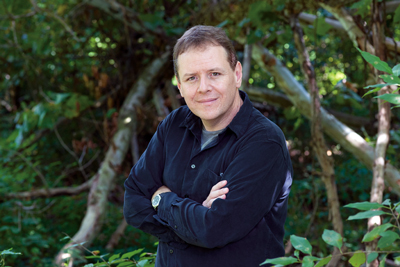
Scribner, a division of Simon & Schuster, recently published "The Inverted Forest" by John Dalton, associate professor of English and director of the Master of Fine Arts in Creative Writing program at UMSL. (Photo by August Jennewein)
John Dalton considers himself a lucky guy. Take 2011. It’s been a great year for the University of Missouri–St. Louis alumnus and faculty member. He was promoted to associate professor of English and director of the Master of Fine Arts in Creative Writing program. Scribner, a division of Simon & Schuster, published his second novel, “The Inverted Forest,” to widespread acclaim in publications like Entertainment Weekly, The Wall-Street Journal and St. Louis Post-Dispatch.
Yeah, 2011 has been kind to Dalton. But years past? As a kid, he probably didn’t envision this banner year.
A self-proclaimed “son of the Midwest,” Dalton grew up in Manchester, Mo. He was the youngest among seven children of working-class parents. His teenage years ended fatherless after his dad lost a lengthy battle with cancer. That weighed heavily on Dalton and his academic life.
“I was a very disinterested student,” he says. “I was a depressed teenager.”
Dalton nearly flunked out of high school, and an evaluation indicated he was not college material. He was washing dishes and says the job felt like a career trap he might not escape. Then, a pending law changed his life. It involved cuts to Social Security benefits for children of the deceased. But if Dalton enrolled in college before the law took effect, he could still receive the benefits. A counselor at Dalton’s school pulled him aside and said, “You have to get over to the community college and enroll full time.”
So he did. Motivation to crack the books soon followed.
“My first class, this psychology class, was taught by a very nice, very pretty young teacher’s assistant,” Dalton says. “I remember thinking, ‘I don’t want this woman thinking I’m a loser.’ So I started studying for the first time.”
He found out he could be disciplined and achieve passing grades. First it was B’s and C’s. By the time he was a student at UMSL, Dalton was pulling down straight A’s. In 1987, he earned a bachelor’s degree in English with a minor in secondary education.
He sought a job teaching high school English. But that objective was short- lived after being saddled with five consecutive seventh grade classes at his first teaching gig.
“I worked harder than I ever worked in my life just trying to control these kids and keep up with all of the paperwork,” he says. “It wasn’t that I was a terrible teacher, it was those seventh graders. I couldn’t control some of those classes.”
His teaching contract was not renewed. Dalton says he remembers feeling like a huge failure.
“As so often happens in cases of failure, it sort of makes you do something drastic,” he says.
In his case, that meant moving away. To Taiwan. There he taught English, paid off his student debt and gained an experience that would later influence his acclaimed debut novel, “Heaven Lake,” which was also published by Scribner.
Upon returning stateside, he enrolled in a prestigious MFA in creative writing program, graduated and returned to his roots in St. Louis and UMSL. He then wrote two books.
His latest, “The Inverted Forest,” focuses its first half on a fortnight at fictional Kinderman Forest Camp in the Ozarks of Missouri. The inexperienced counselors struggle to manage a group of mentally disabled campers. The second half deals with the fallout from a disastrous camp encounter.
“I was a little worried about how ‘Heaven Lake’ readers would receive a book that was darker, stranger and went to a few uncomfortable places,” Dalton says.
But the reception has been good. It probably helps that Dalton navigates the darkness with great warmth in writing his characters. The Wall Street Journal praised his prose calling it “polished and crisp.” Entertainment Weekly perhaps best nailed down the dynamic of the novel: “While some of what’s described is anything but pleasant, reading it certainly is.”
With two successful novels now on the shelf, Dalton is settling into his new role as director of an MFA in Creative Writing pro- gram that is gaining prominence with each passing year. That’s a long way from a futureless career as a pot scrubber or failed high school teacher. Is it luck? Maybe. If so, Dalton has made his own luck.
MFA in Creative Writing program
In August, John Dalton opened the latest chapter of the Master’s of Fine Arts in Creative Writing program at the University of Missouri–St. Louis. He was named director of a program started in 1998 by David Carkeet. The two novelists’ roles bookend Mary Troy’s run of nearly 13 years as director.
Dalton credits Troy, a novelist and short story writer, with nurturing the MFA in Creative Writing to where it is today: a reputable program that attracts talented writers from across the country, produces the semiannual literary journal Natural Bridge and graduates award-winning poets and fiction writers. And it’s not finished there.
“Our program is growing, especially on the fiction side,” Dalton says. “We’re getting more and more applicants. And we’re getting better and better students every year.”
He points to talents like student Angela Mitchell, one of four Riverfront Times MasterMinds recipients this year. She was recognized for her award-winning short stories and a promising beginning to her first novel.
Dalton says the goal moving forward is to bolster the poetry side of the program. To help do this, the program recently received approval for adding a tenure-track poet to the Department of English faculty.
“Our current MFA poetry students are terrific, and we have faculty members with excellent books of poetry and great teaching skills,” Dalton said. “But we need to find an eager and accomplished new poet to push the program forward.”
Visit umsl.edu/~mfa to learn more about the MFA in Creative Writing program.














